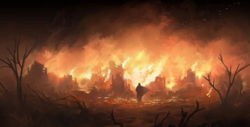Decade of Inharmonious Regrets
| Decade of Inharmonious Regrets | |||||||
|---|---|---|---|---|---|---|---|
 The burning of syndicalist party headquarters happened simultaneously across the Democratic Apollonian Republic of Kildare, under the watchful eye of Tegong officers whom turned against the government. |
|||||||
|
|||||||
The Decade of Inharmonious Regrets is a period, between the end of the Post-Chidao Troubles in 1700 AN and reincorporation of the Democratic Apollonian Republic of Kildare in 1707. The end of the Decade of Regrets is often placed on the Fortuitous Immolation, during which conspirators successfully massacred the most proponent syndicalists and revolutionaries during the sixth month (Fasmas) of 1707 AN.
The coup, with which the Decade ended, was organised by groups of influential families (later noble Houses), Humanist conspirators and exiles and coordinated by the Tegong.
Background
The name of this period - according to the victors - refers to a series of regrets which were seen as choices made by the nation' politicians and elite, which led to a decline in the people's living standard or prestige of Jingdao. It is a silent wish for a return to the glory days of the Great Jing and era of the Chidao Emperor, who was actively involved in the country's affairs. His successor, the Xinshi Emperor, remained impartial and neutral to the government and solely focused on religious matters (at least in public, as it became evident that She was involved in the Tegong's coup in 1707 AN).
Without the authority of the Heavenly Light, whom kept Herself impartial from politics in this period, the Jingdaoese - and later, Kildarian - nation went into decline. The two regrets, joining a Çakari-centered Apollonian empire and the establishment of a Kildarian people's republic, eventually created a disinterest or revulsion towards politics among the normal population.
Despite decades of anti-Raspur propaganda, the desire for re-integration within Shireroth received quite a lot of support among both the higher ups (who already desired to cement their position through some kind of statute of nobility, which had been abolished during the Great Jing) and the masses. Without Heavenly Light they held little trust in their elected leaders. Nostalgia to simpler times, to even 90 years before, strengthened a desire to return - to a (neo)feudal society. Or at least made it an acceptable fait a complis.
Upheavals and protests, especially among the nation's workers, remained throughout 1707, up to 1716 AN - and were crushed with military force and simple divide et impera tactics. The Chastisement of the Hereditary Lords in 1716 AN marked the final destruction of separatist, corrupt and critical resistance among the lower and upper echelons of the Eastern Imperium, with the 1717 Folksraad and Adelsraad elections happening in rather peaceful circumstances.